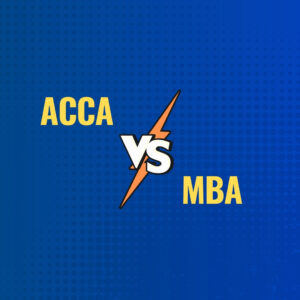Decoding the Choice: ACCA vs. MBA in India

Making the correct decision is crucial in the ever-changing world of higher education and job growth. The ACCA (Association of Chartered Certified Accountants) and MBA (Master of Business Administration) are two well-known choices that frequently compete for the attention of people who want to succeed in finance, accounting, or business management. Both routes have their own advantages, but in order to succeed in your career, you must select the appropriate degree.
Institution:
ACCA
The Association of Chartered Certified Accountants (ACCA) is a distinguished name in the world of finance, established in 1904. With over a century of expertise, ACCA has grown to become a global powerhouse, uniting 233,000 members and 536,000 students in 178 countries. From its inception, ACCA has been dedicated to setting the highest standards in accounting and finance education, producing ethical and skilled professionals.
MBA
The Master of Business Administration (MBA) program in India is a transformative journey that molds aspiring students into management professionals. Offering a comprehensive understanding of business principles, strategy, and leadership, it equips students to navigate the complexities of the corporate world and fosters entrepreneurial thinking.
MBA as a degree is offered by Colleges & Universities in India. MBAs are also offered in the name of Post Graduate Diploma in Business Management (PGDBM) by private institutes which do not come under Government regulation.
Background:
ACCA
The quality of the ACCA course is an unrivaled global benchmark for excellence in accounting and finance education. ACCA’s reputation is built upon a rigorous curriculum that combines technical proficiency with ethical considerations, producing professionals of exceptional caliber. ACCA maintains high quality over a century and across the world.
MBA
The quality of MBA courses in India varies widely among the different institutions that offer it. There are several tiers of MBA institutions, such as Tier 1 to Tier 4. IIM, ISB, FMS, XLRI are considered Tier 1 institutions. Tier 2 MBA institutions are XIME, IFMR, IIT, Great Lakes, IMT. Some of the Tier 3 MBA institutions are LIBA. Tier 4 includes VIT University, SRM University, Anna/Madras University-affiliated colleges. To show you a proper comparison, we will be discussing Tier 1 and 4 institutions against ACCA.
Entry Criteria:
ACCA
The minimum criteria to begin ACCA is the completion of 12th standard at school. ACCA can also be pursued while studying for a degree/professional qualification or after the completion of a degree/professional qualification.
MBA
The completion of any undergraduate degree is a prerequisite for admission to the MBA program in India. It could be BE, MS, BL, B.Com, BBA, or BCA. The applicant must also take an entrance exam such as the CAT, XAT, CMAT, MAT, or GMAT.
To get admitted, candidates must score 95 or higher on entrance exams and pass interviews and group discussions at Tier 1 MBA schools. On the other hand, Tier 4 MBA programs demand lower entrance exam scores. Therefore, it is difficult to secure an MBA seat in Tier 1, while it is very easy to get into Tier 4.
Subjects:
ACCA
The ACCA professional qualification is structured into three levels: the Knowledge level (three papers), the Skills level (six papers), and the Professional level (four papers), totaling 13 papers.
MBA
An MBA program includes a wide range of business-related topics and is more thorough. Courses on finance, marketing, operations, strategy, human resources, entrepreneurship, and leadership are usually included. MBA programs typically last two years and consist of four semesters. MBA students must also complete an internship and turn in a project report.
Career Opportunities:
 ACCA
ACCA
ACCA is well-suited for individuals aiming to build a career in accounting, auditing, or finance. ACCA-qualified professionals are sought after by accounting firms, financial institutions, multinational corporations, and regulatory bodies. Job roles include financial analyst, auditor, tax consultant, and management accountant.
ACCA opens doors to a variety of career opportunities, particularly in the field of accounting and finance. The qualification’s global recognition allows ACCA professionals to work internationally. ACCA is an emerging qualification in India. The job market for ACCA in India is increasing over the last few years.
ACCA does not provide campus placement like MBA institutions, but ACCA offers a career hub website, through which students can apply for jobs. Furthermore, students have to go through a selection test and interview to get the job. ACCA students who have cleared all the subject exams usually start with a salary package of 6 lakhs per annum.
MBA
Depending on the specialization the student has chosen, he will be eligible to apply for roles in finance, marketing, human resources, operations, analytics.
Tier 1 institutions provide placements with top MNCs and Indian companies. Students have to crack the selection test and interview to get the job. Usually most of the students secure a job in the placement process with a salary package starting at 15 lakhs per annum.
Tier 4 institutions provide placement with MSMEs and mid-level companies. Students have to clear the selection test and interview to get the job; the starting salary package would be around 4 lakhs per annum. Not all students get placed in tier 4 institutions.
Cost & Time:
ACCA
ACCA is a cost-effective qualification. In India, the total cost of completing ACCA is approximately ₹4 lakhs, which includes registration fees, exam fees, study materials, and tuition. Students opting for self-study can further reduce their expenses.
In terms of time, ACCA can be completed in approximately 2 to 3 years, depending on the candidate’s prior qualifications and study pace. The flexibility of ACCA allows candidates to choose their study schedule and take exams at their own pace. There is no compulsion for the student to complete the course within 2-3 they can take upto 9 years to complete the course as per their flexibility.
MBA
Numerous universities and business schools in India offer MBA programs, and the prices might differ greatly. MBA program fees start at 5 lakhs for tier 4 institutions and go up to 20 lakhs for tier 1 institutions. The reputation, location, and placement of the institution all affect the cost of the MBA program. It is anticipated that the student will finish the course within two years and not drop it during that time. since this will have an impact on the student’s placement prospects. MBA programs are only worthwhile if they are pursued full-time. As a result, MBA schools in India do not provide flexibility with regard to study or exam options.
Easy or Tough:
 ACCA
ACCA
The strengths and interests of each individual determine how challenging ACCA is judged to be. Dedication and intense study are necessary for the qualification, particularly for the professional-level papers. Candidates must exhibit a solid grasp of accounting principles, tax legislation, and financial reporting requirements in order to pass the ACCA tests, which are renowned for their technical difficulty. With regular study and practice, the ACCA tests’ degree of difficulty can be controlled, but for people without a solid foundation in accounting and finance, it could be quite challenging.
MBA
The difficulty of an MBA program can vary depending on the institution, the rigor of the curriculum, and the student’s prior experience. MBA programs often demand time management, critical thinking, and effective teamwork. While MBA programs may not involve technical accounting or taxation topics, they require a broader understanding of business concepts and the ability to apply them strategically. Case studies, group projects, and presentations are common components of MBA programs that can be demanding but rewarding.
Conclusion:
In conclusion, ACCA and MBA programs in India accommodate a range of professional interests and aspirations. The ACCA is a specialist credential that offers flexibility and cost-effectiveness to individuals pursuing jobs in accounting and finance. On the other hand, an MBA is a flexible degree that offers a comprehensive grasp of business and leads to a variety of employment options, but it usually necessitates a larger time and financial commitment.
In the end, your career goals, existing credentials, financial situation, and the particular information and skills you want to gain will determine whether you choose an MBA or an ACCA. To make an informed choice, you must match your educational path with your long-term professional objectives. The best option for you will rely on your particular situation and goals, however both the ACCA and MBA can be beneficial tools on your career path.
